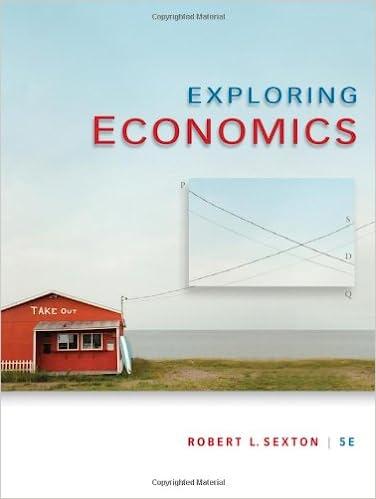Question
1. The production possibilities frontier illustrates A. the combinations of output that an economy should produce. B. the combinations of output that an economy should
1. The production possibilities frontier illustrates
A. the combinations of output that an economy should produce.
B. the combinations of output that an economy should consume.
C. the combinations of output that an economy can produce.
D. All of the above are correct.
2. A production possibilities frontier is bowed outward when A. the more resources the economy uses to produce one good, the fewer resources it has available to produce the other good. B. an economy is self-sufficient instead of interdependent and engaged in trade. C. the rate of tradeoff between the two goods being produced is constant. D. the rate of tradeoff between the two goods being produced depends on how much of each good is being produced.
3. When each person specializes in producing the good in which he or she has a comparative advantage, total production in the economy A. falls. B. stays the same. C. rises. D. may fall, rise, or stay the same.
Table 3-2 Assume that Aruba and Iceland can switch between producing coolers and producing radios at a constant rate.
Labor Hours Needed to Make 1 Cooler Radio Aruba 2 5 Iceland 1 4
4. Refer to Table 3-2.Suppose Aruba decides to increase its production of radios by 10.What is the opportunity cost of this decision? A. 0.25 coolers B. 2.5 coolers C. 4 coolers D. 25 coolers
5. Refer to Table 3-2.Iceland should export A. coolers and import radios. B. radios and import coolers. C. both goods and import neither good. D. neither good and import both goods.
Page 2 of 9
Table 3-3 Assume that Zimbabwe and Portugal can switch between producing toothbrushes and producing hairbrushes at a constant rate.
Machine Minutes Needed to Make 1 Toothbrush Hairbrush Zimbabwe 3 10 Portugal 5 6
6. Refer to Table 3-3.Portugal has an absolute advantage in the production ofA. toothbrushes and a comparative advantage in the production of toothbrushes. B. toothbrushes and a comparative advantage in the production of hairbrushes. C. hairbrushes and a comparative advantage in the production of toothbrushes. D. hairbrushes and a comparative advantage in the production of hairbrushes.
Table 3-7 Assume that Japan and Korea can switch between producing cars and producing airplanes at a constant rate.
Hours Needed to Make 1
Quantity Produced in 2400 Hours Car Airplane Cars Airplanes Japan 30 150 80 16 Korea 50 150 48 16
7. Refer to Table 3-7.Without trade, Japan produced and consumed 50 cars and 6 airplanes and Korea produced and consumed 27 cars and 7 airplanes.Then, each country agreed to specialize in the production of the good in which it has a comparative advantage and trade 28 cars for 8 airplanes.As a result, Japan gained A. 0 cars and 2 airplanes and Korea gained 1 car and 1 airplane. B. 2 cars and 2 airplanes and Korea gained 1 car and 1 airplane. C. 28 cars and 8 airplanes and Korea gained 28 cars and 8 airplanes. D. 52 cars and 8 airplanes and Korea gained 28 cars and 8 airplanes.
Table 3-9 Barb and Jim run a business that sets up and tests computers.Assume that Barb and Jim can switch between setting up and testing computers at a constant rate.The following table applies.
Minutes Needed toNumber of Computers Set Up or Tested in a 40-Hour Week Set Up 1 Computer Test 1 Computer Computers Set Up Computers Tested Barb 48 ? 50 40 Jim 30 40 80 60
Page 3 of 9
8. Refer to Table 3-9.Barb's opportunity cost of testing one computer is setting upA. 4/5 computer and Jim's opportunity cost of testing one computer is setting up 3/4 computer. B. 4/5 computer and Jim's opportunity cost of testing one computer is setting up 4/3 computers. C. 5/4 computers and Jim's opportunity cost of testing one computer is setting up 3/4 computer. D. 5/4 computers and Jim's opportunity cost of testing one computer is setting up 4/3 computers.
Table 3-10 Juanita and Shantala run a business that programs and tests cellular phones.Assume that Juanita and Shantala can switch between programming and testing cellular phones at a constant rate.The following table applies.
Minutes Needed to Number of Cellular Phones Programmed or Tested in a 40-Hour Week Program 1 Cellular Phone Test 1 Cellular Phone Cellular Phones Programmed Cellular Phones Tested Juanita ? 2 160 1200 Shantala 10 4 240 600
9. Refer to Table 3-10.The number of minutes needed by Juanita to program a cellular phone is A. 4. B. 5. C. 7.5. D. 15.
10. Refer to Table 3-10.Which of the following points would be on Juanita's production possibilities frontier, based on a 40-hour week? A. (120 cellular phones programmed, 295 cellular phones tested) B. (130 cellular phones programmed, 225 cellular phones tested) C. (140 cellular phones programmed, 155 cellular phones tested) D. Both (a) and (b) would be on Juanita's production possibilities frontier.
Step by Step Solution
There are 3 Steps involved in it
Step: 1

Get Instant Access to Expert-Tailored Solutions
See step-by-step solutions with expert insights and AI powered tools for academic success
Step: 2

Step: 3

Ace Your Homework with AI
Get the answers you need in no time with our AI-driven, step-by-step assistance
Get Started


